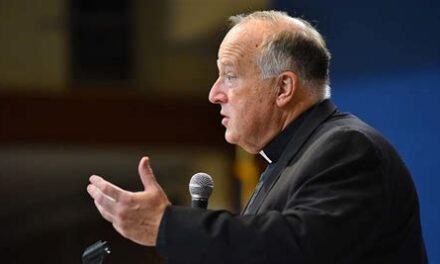In an interview this past December, Pope Francis called the phrase “lead us not into temptation” in the Lord’s Prayer (Matthew 6:9-13; Luke11:2-4), or “Our Father,” confusing. The pope suggested as a possible change the phrase “do not let us fall into temptation.”
Given the pope’s comments, it seems a good time to take a look at how the phrase and the prayer have been taught by authoritative Catholic and Orthodox commentators through the ages, and based on their commentary to consider whether such a change is warranted.
The Catechism of the Catholic Church teaches that the Greek verb for “lead” can mean two things: “do not allow us to enter into temptation” and “do not let us yield to temptation.”
The Catechism goes on to explain that since God cannot tempt or be tempted, and desires “to set us free from evil,” we ask him to prevent us from taking the path of sin. We sin because we consent to temptation. The phrase, the Catechism teaches, “implies a decision of the heart.”
The Catechism shows us, therefore, the importance of our understanding that God cannot tempt or be tempted and that the phrase “lead us not into temptation” is connected to another, “but deliver us from evil.”
Understanding these two points opens up the phrase to us and allows us to read it, and the one that follows, in a positive way: “You (or Thou), God, do not lead us or bring us into temptation. You, God, deliver us from evil.”
Everyone endures trials and temptations. This is one of the conditions of life. With the assistance of the Holy Spirit, the Catechism teaches, we learn to discern between what is a trial that will help us grow in faith and what is a temptation, as well as the difference between a temptation and giving into it.
We learn, too, to depend on God’s grace and mercy. When we are tempted, the Catechism teaches, God gives us the strength to endure the temptation. We must choose, however, to accept the strength, the grace, he gives us to resist or endure.
Christ Our Pascha, the Catechism of the Ukrainian Catholic Church, considers the line an expression of our faith that God does indeed give us this strength.
The Orthodox catechism of Peter Mogila (1596-1647; The Orthodox Confession of the Catholic and Apostolic Eastern Church, J.J. Overbeck, ed., Thomas Baker) offers two interpretations of the phrase. The first is that we offer to God our prayer that he free us from temptation; the second is that if he allows us to be tempted that he ensure that we not be tempted beyond our strength.
Mogila’s catechism further states that with this phrase we ask God to give us the strength to endure martyrdom, if called to be a martyr, and that in such a case that he allow us to suffer only what we can bear.
In his sermons on The Lord’s Prayer (Hilda C. Graef, trans., Paulist Press), St. Gregory of Nyssa (ca. 335-395) explicates this phrase by looking at the entire phrase, “Lead us not into temptation, but deliver us from evil,” and by looking closely at the word “evil.” The word “evil,” he says, refers to the “evil one,” the devil, and so concerns the wickedness found in the world. The Christian prays to God, therefore, to be delivered from the temptations of the world, through the grace of God, that cause him to sin.
St. John Chrysostom (ca. 349-407) also focuses on the word “evil,” but as part of the phrase “the evil one” in his homilies on the Gospel of Matthew (Robert Charles Hill, trans., Spiritual Gems from the Gospel of Matthew, Holy Cross Orthodox Press).
The prayer St. John refers to is the translation of the Lord’s Prayer that continues to be used by the Orthodox today, which reads “deliver us from the evil one” rather than “deliver us from evil.” This is because, as St. John notes, “evil” is derived from the devil or “the evil one.”
In his reading of this line, St. John says that we are instructed to avoid rushing into battle with the devil. The prayer teaches us, he says, that the devil is our enemy, that we are at war with the devil, and that God is our protector.
St. Augustine (354-430) addresses the Lord’s Prayer in his work The Lord’s Sermon on the Mount (John J. Jepson, trans., Paulist Press).
In his discussion of the phrase, St. Augustine uses a slightly different translation: “Bring us not into temptation.” He notes that some translations use the word “lead” and calls it an “equivalent.” When they pray, he says, some explain the word “lead” by thinking of the phrase as meaning “‘Do not suffer us to be led into temptation.'”
God, St. Augustine reminds us, does not bring us or lead us into temptation. He does, however, permit those who have “deserted his aid … to be led by a most hidden economy and by his own deserts.” The prayer, he goes on to say, is “not that we be not tempted, but that we be not brought into temptation.”
St. Augustine’s rich reflection speaks of this line in relation to a number of Old Testament and Gospel passages, including: Deuteronomy 13:3, translated in the text here as “The Lord your God trieth you, that He may know if you love him“; and Our Lord’s words to Peter in Luke 22:31-32, translated here as “Satan hath desired to have you, that he may sift you as wheat …. I have prayed that thy faith fail not.”
A change in the phrase as suggested by the pope would not take its meaning too far away from the traditional understanding of this wording. A change would, however, make the prayer more literal, less poetic, and less evocative.
The problem is not that the phrase is confusing, as the pope suggests. The problem is with the inclination today to make everything easy for the lazy.
A lazy Christian is a lukewarm Christian. Such a Christian is one whose faith most likely will fail when tempted.
Better for the faithful to reflect on the meaning of these words as they currently exist in the translation of the prayer, as part of the entire prayer, and to consult authoritative, traditional sources to assist in their reflection when they cannot understand the meaning.















Bad enough that sisters was added to Saint Paul’s letters in the New Testament, and changed brothers to least ones, in
the Corporeal Works of Mercy. Now, Pope Francis is suggested to change the Lord’s Prayer to watered down version!!!
Has anyone seen the image of the Statue of Saint Peter in Argentina!? The halo and key that he’s holding, has been zapped!
Wake up !! this means something!!